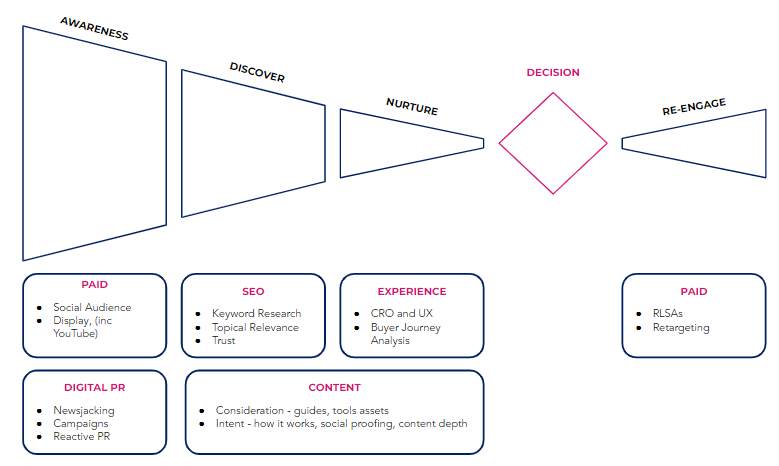The Truth About Good Conversion Rates In Five Minutes.
Do you want an easy and quick explanation of the approach your brand should be taking when addressing conversion rates? Then look no further. In this article, Head of Sales Marcus explains the following:
- What a good conversion rate should look like for YOUR brand
- Different aspects of a conversion rate
- How do I get a relevant page ranking?
- What happens when you get asked about CRO by clients?
What’s not to like? Sit down and let Marcus explain what ‘Good Conversion Rates On A Website Look Like.’ In under 5 minutes. Ready? Start the timer.
Do brands ask what a good conversion rate looks like on the website?
Marcus – They do but to be honest it’s probably not the best way of thinking about it, because if you think of the various stages that someone can come onto a website based on where they are in a customer journey. It’ll make a huge difference in how likely they are to then convert with you or not.
So someone coming on, for example, at the awareness stage looking for inspiration on a new bathroom, they’re very unlikely to go and buy a new toilet and a new bath or tiles or whatever it is. Whereas someone looking for a specific SKU and searching based on that. They will be much more likely to come through and convert with you and there are so many other factors that come into play with it as well, so if you think given two sites side by side, if a customer is looking for something, they’re going to take into consideration stuff like the affinity that they have with the brand, the trust signals that they see on the site, like reviews, delivery, and obviously the price.
So there are dozens of different aspects to a conversion rate, but if I was talking to a prospective client about it, to be honest, you should probably want to build that perspective of just judging yourself based on what you’ve done in the past, rather than comparing yourself to your competitors, because there are so many differentiating factors.
How do I get a relevant page ranking?
Marcus – So you want the most relevant page ranking? If you’ve got, for example, someone searching for, a closed coupled toilet, because they’re looking for part of a new bathroom build and you’re showing them one specific product, even though you’ve got that category page for closed couple toilets and you’ve got that product pages instead of the category page, then that’s a much worse experience.
Do you find that clients ask for CRO as a different service?
Marcus – They do and some companies do split it from their SEO. If you think of where SEO has come from, that website experience and conversion rate optimisation area was seen as a very different endeavour to your SEO campaign.
Now, they overlap to the extent that you can’t really do good SEO or organic search marketing without having that CRO or UX in place it needs to play a role in everything that you do. It sounds pretty tenuous to say that technical SEO should consider conversion rate optimisation or UX, this sort of thing. But really, even when you’re doing stuff like navigation on a website, for example, something like that, you need to be considering the experience of the user and not just the search engine.
We would always look at it as part of the whole package and almost have CRO that runs as a theme through everything you do. I would recommend always looking to bring it in as part of the wider mix.
Want to see more posts like this? We have a newsletter for you to sign up for more information filled posts and in-depth views on trending topics in different sectors, brand spotlights and so much more. Click here to sign up.

